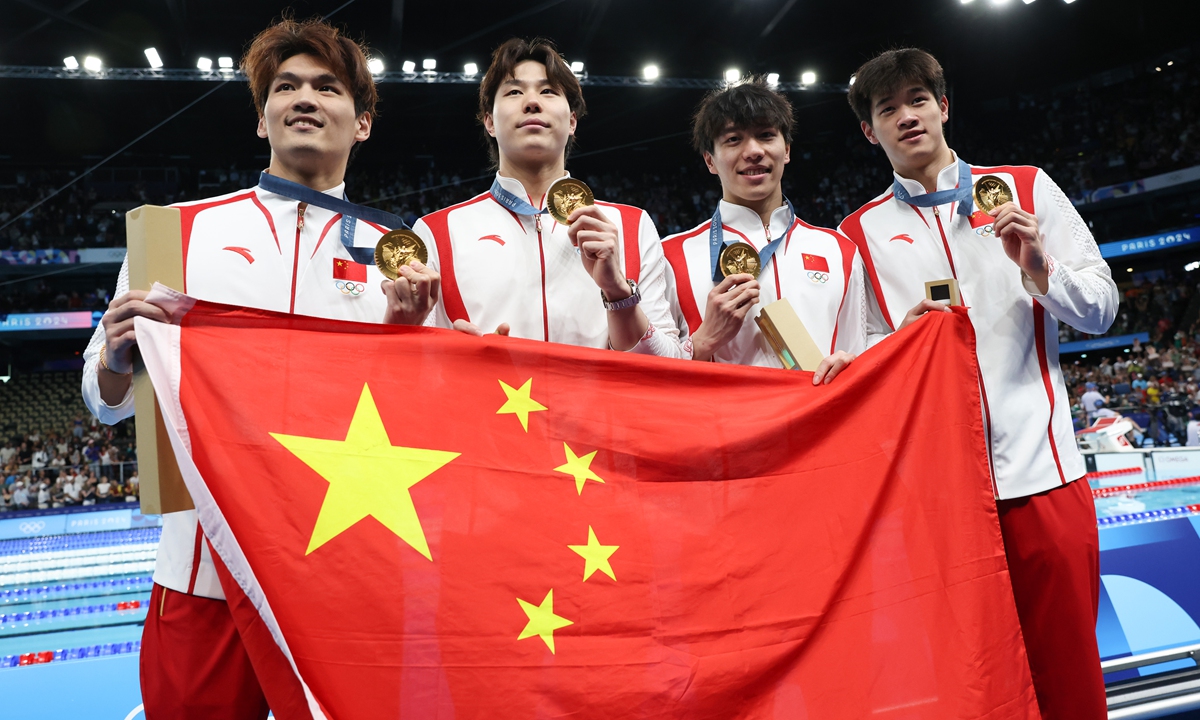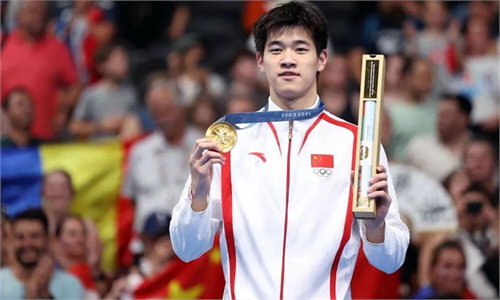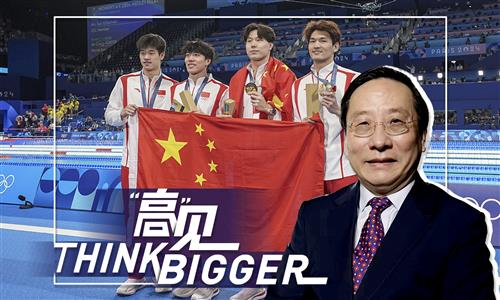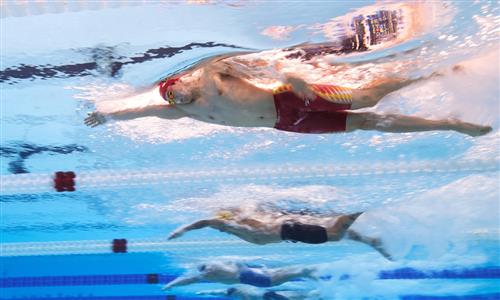Rise of Chinese swimming vivid interpretation of Olympic spirit: Global Times editorial

(From left) Chinese swimmers Xu Jiayu, Qin Haiyang, Sun Jiajun and Pan Zhanle pose for a photo with their gold medals during the awards ceremony for the men's 4x100m medley relay at the Paris Olympics on August 4, 2024. Photo: VCG
All swimming events at the Paris Olympic Games ended on Sunday. On that day, the Chinese team broke the 40-year dominance of the US and won the gold medal in the men's 4X100-meter medley relay, which was a perfect ending to the Chinese swimmers' trip to Paris. When taking a group photo at the award ceremony after the game, the Chinese team originally planned to sit down, but the American team members took the initiative to signal the champion should stand on top. The American team sat down with the French team, and then all team members shook hands and hugged each other. "The most important thing at the Olympic Games is not winning but taking part." This scene is what the Olympics should be like, and it is also a vivid embodiment of the Olympic motto of "faster, higher, stronger - together."
Of course, some Western media are still reluctant to give up, once again provoking the issue of the Chinese athletes' food contamination to the US team at the post-match press conference. American athlete Ryan Murphy said after the 4x100 meters medley, "hats off to China, they did a great race tonight." His praise was sincere. Great champions need great rivals. These high-level athletes may have competed with each other and been familiar with each other since the youth-level competition. No one can understand each other's strength better than them, and can better understand the hardships and sweats behind the honor of the athletes. They helped each other succeed. This is the true meaning of sports competition.
The water in the Paris Olympic pool is not calm. Since April this year, the US Anti-Doping Agency and foreign media such as the New York Times have published a number of false reports to incite dissatisfaction with Chinese athletes and attempted to challenge the testing system of the World Anti-Doping Agency (WADA). They simply ignore the fact that each member of the Chinese swimming team has undergone an average of 21 drug tests since January this year, and they continue to intimidate WADA to clarify "unfounded" matters. Even when the swimming event of the Paris Olympics has come to an end, the Washington Post has not. It still published an article, arrogantly attacking WADA's actions as unacceptable "for an agency that the US funds to the tune of $3.7 million annually." It even suggested that the Chinese team should be banned.
They devised such a grand scheme, with even US lawmakers getting involved, but the outcome was that those rumors neither managed to disrupt the swimming competitions at the Paris Olympics nor "helped" the US team achieve any breakthroughs. On the contrary, it may have backfired, becoming a "distraction" that the American athletes had to try hard to eliminate before the competition. At this Olympics, the US swimming team has won 8 gold, 13 silver, and 7 bronze medals, the fewest gold and total medals since the 2004 Athens Olympic Games. The swimming events in Paris saw multiple teams rising to prominence, with 13 different teams winning gold medals. American swimmer Murphy admitted that their goal is to be champions, but other teams also have dominance in the pool. He noted Italy, China, and France are all rising, and this is not a bad thing as it's good for the sport, according to Xinhua. This shows that most athletes have a clear understanding of right and wrong.
Sports are an important part of American culture, even being seen as a source of national cohesion. Schools and parents in the US are heavily invested in sports, and there is a high level of public participation. Sports can cultivate a sense of competition while also emphasizing respect for rules, attention to process, and cooperation - values that are even more important than competition itself, as no person or country can always be the champion.
The competitive performance of the Chinese swimming team has made significant progress in recent years, enabling them to compete with traditional swimming powerhouses. This success can be attributed to day-in, day-out scientific and systematic training, as well as the experience gained from successive major competitions. Despite various distractions, the Chinese swimming team has continued to advance steadily, and it is no surprise that they have achieved remarkable breakthroughs. According to the logic of some in the West, when European and American athletes break records, it is seen as a breakthrough for "human potential," but when Chinese athletes set records, it is labeled as "humanly impossible." Isn't this absurd double standard a blatant form of racism?
There was also an incident at the swimming events of the Paris Olympics. French swimmer Léon Marchand, who was previously embroiled in a controversy for "ignoring a handshake from a Chinese coach," visited Chinese coach Zhu Zhigen twice and apologized, offering an explanation and exchanging gifts. The gesture earned him praise on Chinese social media for "having grace." In a diverse world, athletes are learning to demonstrate their own and their group's image through their sportsmanship and professionalism. In this regard, the Chinese delegation has done very well, consistently maintaining a composed and confident demeanor even when faced with impolite questions, ultimately winning sincere applause from the outside world.
While the West is the birthplace of most modern sports, other countries are rapidly catching up in both competitive levels and public sports development. The West must accept this change because sports belong to all humanity. As the father of the modern Olympics, Pierre de Coubertin, said, from sport, "the young worldwide learn self-respect, and thus the diversity of national qualities becomes the source of a generous and friendly rivalry." Although some people and media in the West still resist this idea, they will eventually have to accept it.



